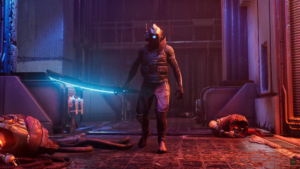
Baldur’s Gate 3 is somehow still turning up juicy little surprises. Granted, I only used Speak with Dead when I had to claw info from the grave for an investigation—I rarely did it just for flavour kicks. This use of the spell in Act 3 has some wild implications only obvious to those with tabletop brainworms (like yours truly), and I’m here to pass on that existential dread to you.
If you use Speak with Dead on Lord Gortash after killing him, you get the following dialogue—courtesy of user Impressive-Ad2973 on the Baldur’s Gate 3 subreddit.
ACT 3 : interesting conversation speak with the dead Gortash from r/BaldursGate3
Gortash isn’t home. In a fitting end for the smarmy bastard, his master Bane is torturing him forevermore, such is “the fate of all who fail” him. The lines are unvoiced, which do regrettably mark another wrinkle in Act 3’s spotty polish—though that’s being addressed with refreshing speed—but it’s still a fun surprise.
What’s funny to me is that Bane, a god of tyranny and control, is somehow bound by the rules of a third level spell. I doubt that’s actually the case—he’s likely just chatting to you for kicks—and there’s some spine-chilling stuff in there when it comes to earning Bane’s favour. Turns out he doesn’t really care when his lieutenants are killed, as that means whoever gutted them has a bigger lust for power. Killing Gortash just makes you interesting to Bane, not his sworn enemy.
The more unsettling implication here lies in the first line of Speak with Dead dialogue—Bane makes mention of Gortash’s soul being in his hands, except that’s not how the spell actually works, at least not in Dungeons & Dragons fifth edition (the ruleset Baldur’s Gate 3 is built upon). Here’s an excerpt from the spell’s tabletop counterpart: “This spell doesn’t return the creature’s soul to its body, only its animating spirit. Thus, the corpse can’t learn new information, doesn’t comprehend anything that has happened since it died, and can’t speculate about future events.”
This is good because Speak with Dead is an awesome spell for storytelling—but for a lot of good-aligned characters, disturbing a spirit’s rest might be going a step too far. Speaking with a body’s memory is far more palatable for most—you’re just asking what the body remembers, and that sure isn’t going anywhere quick. However, this Speak with Dead interaction specifically calls out Gortash’s soul as a point of contact that Bane is meddling with.
There are two clear scenarios here. Firstly, Baldur’s Gate 3’s version of the spell is, canonically, more intrusive. It actually picks the soul from its resting place. I’m less inclined to believe this option, since most other Speak with Dead interactions refer to “the corpse”. Most bodies also don’t respond like a soul would, hewing closer to D&D’s version in how they talk.
The second possibility is that Bane has a strong enough link to Gortash, one that lets him know when magic’s messing with his body, and has decided to meddle with the spell to try to recruit you, as he lays out a path to earn his favour: “commandeer the brain and unleash your infected army, and I will count you among my chosen.” Not terrifying in the slightest. Either way, I feel like we’ll be unearthing new interactions—like that one Astarion-specific rant about friendly fire—for months to come.
- SEO Powered Content & PR Distribution. Get Amplified Today.
- PlatoData.Network Vertical Generative Ai. Empower Yourself. Access Here.
- PlatoAiStream. Web3 Intelligence. Knowledge Amplified. Access Here.
- PlatoESG. Automotive / EVs, Carbon, CleanTech, Energy, Environment, Solar, Waste Management. Access Here.
- PlatoHealth. Biotech and Clinical Trials Intelligence. Access Here.
- ChartPrime. Elevate your Trading Game with ChartPrime. Access Here.
- BlockOffsets. Modernizing Environmental Offset Ownership. Access Here.
- Source: https://www.pcgamer.com/this-act-3-speak-with-dead-scene-in-baldurs-gate-3-has-worrying-implications-given-the-spells-dandd-roots
- a
- About
- act
- Act 3
- actually
- after
- All
- also
- among
- an
- and
- animating
- Another
- Anything
- ARE
- Army
- as
- asking
- At
- awesome
- Baldur's Gate
- BE
- because
- being
- believe
- bigger
- bodies
- body
- bound
- built
- by
- calls
- care
- characters
- Chatting
- chosen
- clear
- closer
- come
- comes
- comprehend
- contact
- Control
- Conversation
- corpse
- Counterpart
- dead
- decided
- DID
- died
- do
- doesn
- don
- Doubt
- Dungeons & Dragons
- Earn
- Earning
- edition
- either
- end
- enough
- events
- except
- existential
- Fail
- far
- Fate
- feel
- First
- fitting
- Following
- For
- friendly
- from
- fun
- funny
- future
- Gaming
- Get
- given
- going
- good
- granted
- had
- hands
- happened
- has
- he
- here
- him
- his
- Home
- How
- however
- HTTPS
- i
- implications
- in
- info
- information
- interaction
- interactions
- interesting
- intrusive
- Is
- isn
- IT
- ITS
- jpg
- just
- know
- Lays
- LEARN
- least
- less
- Level
- lies
- like
- likely
- Line
- lines
- LINK
- Little
- ll
- lot
- Magic
- MAKES
- mark
- master
- me
- means
- memory
- might
- months
- more
- most
- my
- New
- not
- obvious.
- of
- on
- One
- only
- Option
- Other
- out
- palatable
- pass
- path
- place
- plato
- plato data intelligence
- platodata
- platogaming
- Point
- possibility
- power
- quick
- rarely
- RE
- really
- recruit
- refer
- respond
- REST
- resting
- return
- roots
- rules
- s
- Scenarios
- scene
- seasonal
- second
- since
- some
- Soul
- speak
- Speaking
- specifically
- spirit
- step
- still
- strong
- such
- sure
- surprise
- surprises
- Tabletop
- talk
- that
- The
- Them
- there
- they
- third
- this
- those
- Thus
- to
- too
- truly
- try
- turning
- turns
- two
- Tyranny
- unleash
- up
- upon
- use
- used
- User
- version
- way
- we
- What
- when
- WHO
- whoever
- wild
- will
- with
- works
- would
- you
- your
- zephyrnet











